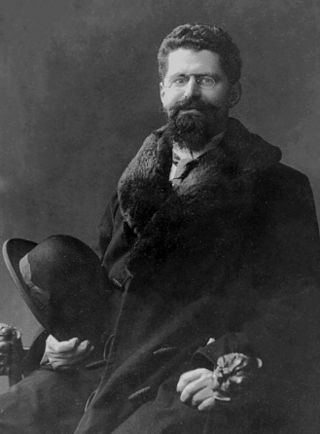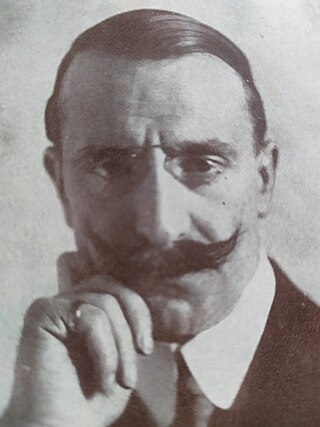
Arturo Graf (18 January 1848 – 30 May 1913), was an Italian poet and literary critic.

Arturo Graf (18 January 1848 – 30 May 1913), was an Italian poet and literary critic.
He was born in Athens, Greece, to a father born in Nuremberg, and a mother from Ancona. His father was a merchant but with wide-ranging literary interests and fluent in multiple languages. As a boy, the family moved to Trieste. Arturo, who spoke both Greek and Italian, travelled extensively through Italy during his youth. Circa 1855, after the death of his father, the family lived with his maternal uncle for a time in Braila, Romania. There he learned Latin with private tutors. In time, he moved with his mother to Naples to further his studies. He continued to travel through Italy, graduating from Liceo in 1867 and enrolling in University to study law. After graduating, he briefly moved back to Romania to work in what was now his brother's business, but was back in Rome by 1874. In these years, he composed some books of poetry.
He was educated at the University of Naples and became a lecturer on Italian literature in Rome, till in 1876 he was appointed professor of Comparative History of Neo-Latin Literature at the University of Turin. [1] In 1882 he became professor of Italian literature at Turin. Afflicted with various ailments during life, he stepped down as a professor in 1910.
He was one of the founders of the Giornale della letteratura italiana, and his publications include valuable prose criticism. he also published in other journals such as Nueva Antologia, Rivista Europea, Rivista di Filologia e d'istruzione classica, Rivist di fillologia romanza, and rivista di filosofia scientifica. He is best known as a poet. His various volumes of verse—Poesie e novelle (1874), Dopo il tramonto, versi (1893), Le Danaidi (1897), Morgana (1901), Poemetti drammatici (1904), and Le rime della selva (1905) —give him a high place among the recent lyrical writers of his country. [1] He was prolific in his literary analysis. He wrote the romance novel Il riscatto (1901). [2]

Saverio Bettinelli was an Italian Jesuit writer. He became known as a polymath, dramatist, polemicist, poet, and literary critic. He was a friend of some of the leading authors of his times: Voltaire, Francesco Algarotti, Vincenzo Monti and Ippolito Pindemonte. Théodore Tronchin, Guillaume du Tillot, Melchiorre Cesarotti, Giacomo Filippo Durazzo, Pietro Verri, Giammaria Mazzucchelli and Francesco Maria Zanotti were among his correspondents.

Cesare Cantù was an Italian historian, writer, archivist and politician. An immensely prolific writer, Cantù was one of Italy's best-known and most important Romantic scholars.
Count Adelardo Tommaso Salvadori Paleotti was an Italian zoologist and ornithologist.

Francesco Severi was an Italian mathematician. He was the chair of the committee on Fields Medal in 1936, at the first delivery.

Francesco de Sanctis was an Italian literary critic, scholar and politician, leading critic and historian of Italian language and literature during the 19th century.
Giorgio Bàrberi Squarotti was an Italian academic, literary critic and poet. He taught at the University of Turin from 1967 until his death in 2017. He was considered to be one of the most important literary critics of his time.
David Castelli was an Italian scholar and educator in the field of secular Jewish studies. He was educated at the rabbinical college of Leghorn, and from 1857 to 1863 was teacher of Hebrew and Italian in the Jewish schools of that city. Then he became secretary of the Jewish congregation in Pisa, where at the same time he was a private teacher. From January 1876 until his death he occupied the chair of Hebrew at the Istituto di Studi Superiori Pratici e di Perfezionamento in Florence.

Girolamo Graziani was an Italian poet and diplomat.
Valentino Annibale Pastore was an Italian philosopher and logician.

Pier Alessandro Paravia was born in Zara, Dalmatia on July 15, 1797 and was a Dalmatian Italian writer, scholar, philanthropist and professor of Italian eloquence at the University of Turin.

Carlo Troya was a historian and politician who served as Prime Minister of the Two Sicilies from 3 April 1848 until 15 May 1848. Politically, he was a liberal Neo-Guelph who supported Italian unification. His primary historical interest was the study of the Early Middle Ages, to which he made lasting contributions.
Marcello Landi (1916–1993) was an Italian painter and poet.
Andrea Della Corte was an Italian musicologist and critic. Born in Naples on 5 April 1883, Della Corte studied law at the University of the native city, but was self-taught in music. After some short experiences in Neapolitan papers, he moved to Turin, where he was music critic for La Stampa from 1919 to May 1967. He brought the music journalism in Italy to a level of «professionalism hitherto unknown». In Turin, Della Corte also taught history of music, both at the Turin Conservatory (1926–53) and at the University of Turin (1939–53).

Franco Pappalardo La Rosa is an Italian journalist, literary critic, and writer. He graduated from Turin university. He has lived in Turin since 1963. He contributed to cultural pages of Giornale del Sud, L'Umanità and Gazzetta del Popolo, and to many dictionaries, as Dizionario della Letteratura Italiana, Grande Dizionario Enciclopedico-Appendice 1991 and Dizionario dei Capolavori. Nowadays he contributes to many literary magazines, as Hebenon, Chelsea and L'Indice. He edited the publication of some works written by contemporary Italian writers, as Stefano Jacomuzzi, Giorgio Bàrberi Squarotti, Emanuele Occelli, Francesco Granatiero and Angelo Jacomuzzi. He took part in National and International Conferences on figures and aspects of contemporary poetry and fiction. He edits I Colibrì, fiction library between journalism and literature. He is founding member and member of the Board of Governors of the International Association “Amici di Cesare Pavese”.
Nicoletta Pasquale, known also as Coletta Pasquale or Paschale was an Italian poet.

Ottavio Serena was an Italian politician, judge, prefect and historian. He is known in his hometown Altamura for his works about local history, such as the Altamuran Revolution (1799). His contribution and the testimonies he collected allowed to shed light on some historical events (such as the killing of Giovanni Firrao and on legendary toponyms.

Guido Chiarelli, was an Italian electrical engineer. He is known for his pioneering work in public lighting.

Giorgio Ficara is an Italian essayist and literary critic. He is Full Professor of Italian Literature at the University of Turin.

Enrico Thovez was an Italian artist-polymath best known for his contributions as a poet and literary critic.
Natalino Sapegno was a literary critic and Italian academician. He came to prominence as a leading scholar of fourteenth century Italian literature.